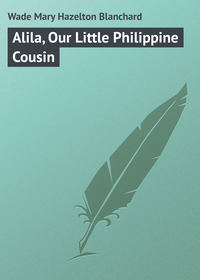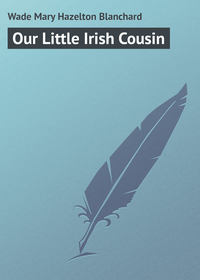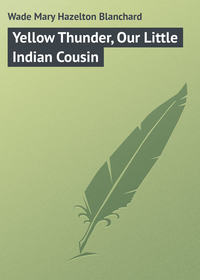 полная версия
полная версияOur Little Porto Rican Cousin
Dolores's mother hires some of the coloured children to collect petals of the coffee flowers as they drop upon the ground. She will fill jars with them to scent her drawing-room with their perfume; but no one is allowed to pick the blossoms from the trees, for each flower means a berry later on in the season.
As the fruit forms, it is first green, then a pale pink, and at last a bright red. Not all the berries ripen at the same time, as cherries do, so the autumn picking lasts several weeks.
After they have been gathered, the berries are first washed and then hulled by machinery. Even then, however, they are not ready for market, for they must still be dried. At Manuel's home this is done by spreading them on floors paved with stones, where the sun can shine upon them; but on larger plantations it is usually done by steam or hot air.
The men and women who work for Manuel's father are always busy, for there are many things to do besides attending to the coffee-trees. These stand in rows about fifteen feet apart, and between the rows there are "catch crops," as they are called. One can see sweet potatoes, pigeon pease, eddoes, and other vegetables.
Coffee-trees are quite tender, and need a good deal of shade when they are young, so banana and plantain trees have been planted between the rows to protect them from the hot sun.
Manuel's father does not pay his workmen in money; he gives them a certain number of plantains for each day's labour. They keep enough of this fruit to feed their families, and sell the rest in the towns near by.
The children stop for a chat with the overseer, then ride onward to the house, for dinner must be ready.
Just as the meal is over, and the family leave the dining-room, the convent bells begin to ring. It is six o'clock, the time for evening prayer, and all bow their heads in silence. Although Manuel is a little boy, he likes these quiet moments in the day. The air is filled with peace; it seems as though he feels God's love more fully than at any other time.
CHAPTER VI.
SONGS AND STORIES
Night falls suddenly on this beautiful home. There is no long twilight as in northern lands; and soon the stars are shining, myriads of them. They do not twinkle, but give a strong, steady light.
This is the best part of the day. The planter sits on the veranda, smoking; his wife, in her delicate evening dress, keeps him company. Teresa plays some sweet tunes on her guitar and sings, while her duenna sits back in a rattan chair and dozes. Manuel and Dolores dance together along the garden paths or play with their fireflies.
Hark! listen to that lively music coming from the homes of the workmen. We know there are mandolins among the instruments they are playing, but what is that strange, swishing noise we hear, keeping time with the other instruments? It is somewhat like the sound of shuffling feet. It is made upon gourds notched in many places, with holes in the shape of triangles cut in the necks.
A few nights ago Manuel and Dolores begged their father to take them over to the "quarters," as the cabins of the coloured farm labourers are called. Manuel said:
"We want to see the sport. They have such good times over there when their work is done, and do tell such funny stories. But, after all, papa, it's the way they tell them that I like best. Their black eyes are so solemn and look as though they believed every word that is said."
When the planter and his children drew near, they found the coloured people squatting in a big circle in front of one of the huts. The sun was just setting in a great round ball in the west. There was still light enough in the sky to show the shining dark faces ranged around. Two rows of glistening ivory teeth could be plainly seen in each face as the workmen jumped up to bow and smile before "Massa, little Massa, and little Missus." They were quite proud to be honoured by a visit from these great people. And now the sun suddenly dropped below the horizon, and the air seemed filled with the darkness.
It was the sign to begin, and the blacks, at a motion from their leader, started in with an old, old song not learned from books; it had been handed down from the time when their people lived in their native land of Africa. It was a song about a beautiful star, and before it was ended Dolores and Manuel felt as if the star itself were a living friend and helper of these ignorant, earnest people.
Sing! The word does not begin to describe the music they not only heard but saw and felt. The voices of the singers were sweet and rich; their bodies swayed back and forth, keeping perfect time. Their great round eyes rolled from side to side, and as they sang verse after verse, they seemed to forget their company as well as themselves. Their faces shone with a smile of perfect happiness.
When the song was ended a story was called for, and an old gray-haired man began to tell this tale of the elephant and the whale.
"Once upon a time an elephant was walking on the shore. He saw a whale in the water. He spoke to the whale and said:
"'Brother Whale, I can pull you up on to the shore.'
"'Indeed you can't,' cried the whale.
"'I bet three thousand dollars that I can,' the elephant answered.
"'All right, let me see you try,' the whale said, quickly, and went away.
"Soon afterward they met again. The whale spoke this time, and said:
"'Brother Elephant, I can pull you into the sea.'
"'What an idea!' said the elephant. 'No man in the world could pull me into the sea.'
"Brother Rabbit heard the two talking, and said:
"'I'll try it to-morrow at twelve o'clock.'
"He went away and got a piece of rope. He tied one end of it around the whale's neck and the other around the elephant's neck. Then he said:
"'When I speak the word you must both pull hard.'
"Now when the whale pulled, he dragged the elephant into the sea. He said:
"'You, Brother Elephant, think the little rabbit is doing all this.'
"Then the elephant pulled hard, and brought the whale into the surf. The whale caught underneath a shelf of rock and the elephant found himself fastened to a big tree.
"These two mightiest of creatures pulled and pulled, till at last the rope broke, and the elephant was jerked way back into the forest and the whale was jerked way out to sea. That is why you always see the whale in the ocean and the elephant in the woods."
There was a great clapping of hands when the tale was ended. After that, there were other songs and stories, while the faces of the people grew more earnest and eager after each one.
It was growing late, and Manuel's father said:
"Come, children, we must go now. Your mother will be watching for you. It is long past your bedtime."
As they walked homeward, Manuel was quiet for some time. Then he said:
"Father, what nonsense many of these stories are! Yet I like them, too, because they seem to bring one so near all living things. Even the rabbit and the elephant are brothers to them. It's a little odd, though, that in their animal stories they always make the rabbit the wisest."
Sometimes Manuel's father walks over to the "quarters" with his boy to see the dancing. It is wild and exciting; it fairly makes Manuel dizzy to watch the people twist and turn themselves about. It is so different from the slow, graceful steps he and Dolores have been taught.
One wonders if the children are not afraid of snakes in the long grass at night. No, for in all Porto Rico, it is said, a poisonous serpent has never been seen. In two other islands of the West Indies the most deadly snake of the Western world is found. This is the terrible fer-de-lance whose bite is so much dreaded; but this serpent has never made its way into Porto Rico. It probably drifted on limbs of forest trees from South America to the other islands, but never reached Manuel's home. The boy should be very grateful that it did not.
But there are other things for him to fear. When he goes to bed to-night, he will get Juana to look under his bed and in every corner of the room before he can settle himself to sleep. Is he afraid of burglars, do you suppose? He never thinks of them; but he knows that scorpions and centipedes can creep into the house, and even into his bed, without being seen. And oh! their sting means very great suffering. Manuel's mother was once stung by a scorpion's fiery tail, and the wound was very painful for a long time.
It was only a few nights ago that Juana found a centipede snuggled away under a cushion in the sitting-room. Suppose some one had sat down upon it unawares and been bitten! It makes the shivers creep up and down Manuel's back to think of it.
The word centipede, perhaps you know, means hundred-footed. These little insects travel quite rapidly, and although they do not cause death, they may make very painful wounds.
There are other things, too, to trouble Manuel and Dolores, for mosquitoes and fleas are always plentiful, and sometimes the children are awakened at night by an attack from a small regiment of cruel little ants, and sleep no more till morning.
There is a certain insect in the West Indies known as a "chico," "chigoe," or "jigger," and woe to the toes of the person whom it visits. It gets under the skin, and there lays many eggs and prepares to make itself very much at home. So if any person's toe begins to itch, he needs to have it examined at once, or there may be trouble. People have sometimes been obliged to have the toe, and even the foot and leg, cut off on account of the inflammation caused by a chico and her family.
But the curious thing about it is that this insect seems to prefer the toes of white strangers, so that Manuel and Dolores, who were born on the island, are pretty safe in going barefooted.
CHAPTER VII.
A CRUEL SPORT
To-morrow there will be "lots of fun," as Manuel says. After the morning service in the church (for it will be Sunday) his father will take him and Dolores to a cock-fight. Manuel has been brought up to think there is no pleasure like it.
When our government took charge of the island, after the war with Spain, they forbade any more cock-fighting. But all the people, black and white, loved the sport so dearly, and felt so bad on account of the new law, that it has been set aside for the present.
Yes, Manuel, our gentle, kind-hearted little cousin, has seen many cock-fights. Sunday is the day his people take for the cruel pleasure. The boy's father has a very handsome cock he has been training for to-morrow's fight. He has bet quite a large sum on him, and is even more anxious than his little son for the next day to come. Why, this game-cock of his has been getting as much care and attention as a fine horse or pony generally receives from a loving master!
And now it is Sunday. Not even a flea has disturbed Manuel's dreams all night. Late in the afternoon a carriage comes to the door, and the planter drives away to the town with his two younger children. His wife and Teresa do not go, as it is not considered proper; but it is thought to be all right for Manuel and Dolores, as it is the fashion of this country for boys and little girls to go.
What a crowd there is around the entrance! Men and children, both black and white, are jostling each other, talking loudly, and quarrelling together. See that man elbow his way along! He has a cock under his arm, probably a contribution to the entertainment.
Manuel's father beckons to a servant who has followed him on horseback with his precious game-cock in charge, and together they pass inside. Every one must pay for admission to the show. And what does one see within? There is a large cleared space covered with sawdust. This is for the cocks; all around are seats for the people who look on.
Over at one side of the pit a man is lifting the cocks, one by one, and weighing them to find their fighting weight. See the care with which each skinny fowl is tied in a bandanna and handled; one would think it something very precious. And, indeed, they are precious, and cost their owners many dollars.
Look! the men are fastening sharp knives to the spurs of the poor fowls, whose necks and backs are bare of feathers. These knives are sharper than the natural spurs, and will help to make the battle a deadly one. They are not always used, however.
And now, in the midst of shouts and yells, the first battle begins. It means death to one or both of the birds. The two cocks enter into the fight as though they delight in it. See the feathers fly from their heads and sides!
Ah! one of them is blinded by the dust. His owner rushes up and squirts alum water in his eyes. The fight goes on till one cock lies breathing his last on the ground, and the other stands beside him dizzy and tottering, yet hanging to him still.
There is silence while the bets are paid; then the noise begins again, and two more cocks are brought in. Battle after battle is fought till night falls upon the cruel sport.
There is no doubt that these game-cocks enjoy fighting, yet this is no reason they should be pitted against each other by human beings; nor that people should think it sport to watch suffering and bloodshed even among stupid fowls.
It is hoped that Manuel and Dolores will learn better as they grow older. We cannot blame them now, for the customs of their country have made it seem quite right and proper.
A still more cruel sport was brought by the Spaniards to Porto Rico, but it is now forbidden by American law. This is bull-fighting. It is not long, however, since the finest ladies in the land dressed themselves in their handsomest gowns, and with their husbands attended a bull-fight. You would have thought to see the rich jewels and fans, the fine silks and satins, that they were in a ballroom.
Do not let us think of such sad things any longer, however. Those days are gone by for ever, let us hope.
While Manuel and Dolores are giving their mother an exciting account of the Sunday's pleasure, let us go back to the Porto Rico of long, long ago.
CHAPTER VIII.
EARLY TIMES
We find Columbus sailing into one of its harbours after his second trip across the great Atlantic Ocean. The trees and plants look very beautiful to him. But he notices other things; he sees rivers flowing down into the sea, and the natives tell him of stores of gold to be found in the beds of these streams. For this reason he calls it "Puerto Rico," or the "Rich Port," and so it has been called to this day.
He and his men are full of interest in the strange sights around them. In the waters about Porto Rico are wonderful creatures they have never seen before. Among these is the manatee, which, rising up out of the water, looks at a distance somewhat like a human being.
"It is a mermaid," cries Columbus, "but, alas! it is not as beautiful as I expected." He wrote of it in this way in the account of his voyage.
In those days of long ago people had many queer ideas. One of these notions was that beings lived in the sea who had heads and arms like men and women, but the lower parts of their bodies were shaped like fishes. They were, therefore, half human and half fish. Their home was far down in cool groves at the bottom of the sea. A diver once said he had visited the very place. He found the water perfectly clear, and lighted up by crystal pyramids. There were gardens of beautiful sea-weeds, furniture all made of precious stones, and the strange beings dwelling there wore ornaments and combs of shining gold.
They believed that these beings of the sea rose sometimes to the surface of the water. There they would sing sweet songs as they combed their long yellow hair. But they sang only to make the sailors forget their own homes and to lead them into harm.
It was no wonder that Columbus was disappointed when he discovered the manatee, and believed he had at last seen the mermaids of whom he had read so many stories. The sea-cow is certainly not a beautiful creature. It looks somewhat like a small whale; it has a fat body, with small eyes and ears. It is very timid, and probably swam off as fast as it could when it found the vessels of Columbus near. Of course, the great sailor did not get a good view of it or he could not have believed it to be the mermaid described in song and story.
Not many years after Columbus discovered Porto Rico, Ponce de Leon led a company of Spaniards to its shores and settled there. The Indian chief of the country was very kind to the strangers. He gave them provisions and rich presents, and showed them the fruits and vegetables which grew there. He shared his treasures with them, and, most important of all, he led them to a river where stores of gold could be found in its bed.
Gold! It filled the Spaniards' hearts with greed. This was what they had longed for; now they could go back to their own country with great fortunes.
How did they return the kindness of the gentle, trusting natives? By treating them like slaves! By making them do the hardest labour, and then rewarding them with cruelties.
When they first came to the shores of the island they had said to the Indians: "We are immortal; we cannot die; we will live on for ever."
But when the poor Indians had suffered for a long time at their hands, and when many of their kindred had died from the ill-treatment of the Spaniards, they said:
"We will prove what these cruel strangers have told us."
They seized a Spanish soldier and held his head under water for two hours. Then they carried his body to the shore of the river, and sat down beside it for two whole days. But it showed no signs of life. At the end of that time they took the body to their chief, who said:
"They have deceived us, for this man has died, even as we would die."
You can easily imagine what followed. There was war between the natives and the strangers. But the poor Indians had little chance. They had only bows and arrows, rough spears of wood, and battle-axes of stone. The Spaniards were armed with swords and guns. Those Indians who were not killed were made prisoners and set to work in the gold mines and sugar fields, where they rapidly died from their hard labour.
Years passed by. Ponce de Leon was growing old. His hair was gray; his face was wrinkled; the top of his head was bald. He had many pains in his body and was often ill.
Then he thought of the stories told by his Indian slaves of a wonderful fountain not far away. They declared that its waters were always fresh and pure; not only this, but each draught that a person swallowed would make him younger and happier.
"Ah!" sighed the old man, "I wish I might find this spring of living water, and rid myself of stiff joints and rheumatism. I will start out in search of it at once. If I can only reach it, I shall become young and handsome again, and shall never die."
This was the reason the conqueror of Porto Rico sailed away to find the wonderful Fountain of Eternal Youth of which the Indians had told him.
You probably know the story of the coming of Ponce de Leon to Florida one beautiful Easter Sunday, which in the Spanish language is called Pascua Florida. So he called the country Florida, saying:
"In this beautiful land must be the wondrous fountain."
Soon afterward, while searching for it, he was shot with a poisoned arrow, and died on the voyage back to the island.
CHAPTER IX.
THE CARIBS
The Indians whom Ponce de Leon and his followers treated so unkindly were gentle and generous, as I have said. They were not eager for war, like many of the tribes on the continent, nor savage in their habits. They wore short girdles of cotton cloth, raised crops of corn and manioc, and built large canoes in which they took quite long voyages. They wrought the gold found in the streams into ornaments.
This tribe of Indians was very numerous at the time the Spaniards first came to the West Indies, but now there is not a single trace of them left. War with the Spaniards, hard work for their masters in the mines and fields, – these made the race die out rapidly.
It is sad to think that the Spaniards tortured them also.
Is it any wonder that the natives did not care to share the Spaniards' heaven, but died hating them with all their hearts?
Long before Ponce de Leon came to Porto Rico, the poor Indians were attacked from time to time by other enemies; but although they suffered much, they were never conquered. These enemies were the Caribs, who seemed to love war better than anything else in the world.
Sometimes the people would be strolling along the shores of the island when they would see something out on the ocean which looked like a mass of floating palm leaves. That did not frighten them, of course, and they would go on with their sports.
When it was too late to give the alarm, they discovered that the mass of palm leaves was the covering of a boat-load of fierce warriors who were all ready to attack them.
Or perhaps their foes would hide themselves from sight in some other clever way until they were all ready to spring out of their boats and take the peaceful islanders by surprise.
You wonder, perhaps, where was the Caribs' home. They told legends of a far-distant land in the north, from which their own people had come. They had fought their way from Florida to South America, and feared no one in the world. They believed that their tribe had grown up out of the stones which had been planted in the soil.
They belonged to the great Indian, or red, race, as did the natives of Porto Rico, but their customs and natures were very different. They painted their faces to make themselves look as fierce as they felt. They were trained to fight from the time when they were little children. They loved to sail upon the ocean, and guided their boats by studying the stars.
When the Spaniards had settled in Porto Rico, the Caribs thought it would be an easy thing to master them in fight, and trouble them as they had troubled the poor natives. But the white men were a match for them, and, when they landed on the shores of the island, the Spaniards entrapped them and drove them over the side of a cliff down into the water below. Not one Carib lived to tell the story of that fearful day.
Time passed by and many workers were needed, and as the natives became fewer the Spaniards sent ships to the coast of Africa and brought away the black people to be their slaves. To-day the negroes are all free and seem to be happy in their island home; but most of them are very, very poor, as are the greater part of the whites of Porto Rico. The rule of Spain has kept them so; and it was a glorious thing for these people when our soldiers, under General Miles, marched in triumph through the land.
CHAPTER X.
A SEASIDE PICNIC
Several weeks have passed since Manuel and Dolores went with their father to the cock-fight. It is a beautiful June evening, and the children are walking through the garden, planning a picnic at the seashore for to-morrow. Their mother comes out hastily on the veranda, and calls:
"Manuel! Dolores! come in at once out of the moonlight! You know well enough that animals will never lie with the moon shining upon them; they are too wise. Oh, the evil I have seen that has come from the moon! Don't you remember poor little Sancho? He is feeble-minded because his careless nurse let him sleep in the moonlight when he was a baby. Come quickly, my darlings, to the shade of the veranda."
Manuel and Dolores are a little frightened, and hurry toward the house, where they join the family in Spanish songs before going to rest.
When Juana wakes them, early the next morning, they hear the rain falling in torrents outside. That will not prevent the picnic, however, for they feel sure it will not last long. It is the beginning of the spring rains, and there are showers every day, but they seldom continue more than an hour. But, oh, how the rain falls when it does come! It seems as though the heavens opened and all the water in the sky fell at once.
By eight o'clock the shower is over, and Teresa, her duenna, Manuel, and Dolores are ready to start. The planter must be busy to-day, and his wife does not care to go.
A low, comfortable carriage is drawn up in front, the lunch is packed away under the seats, and the coachman is told to start. Ponce tries to follow, but Manuel orders him back. They will drive at least ten miles, but the roads are fine, it is down-hill all the way, and the views are beautiful.









